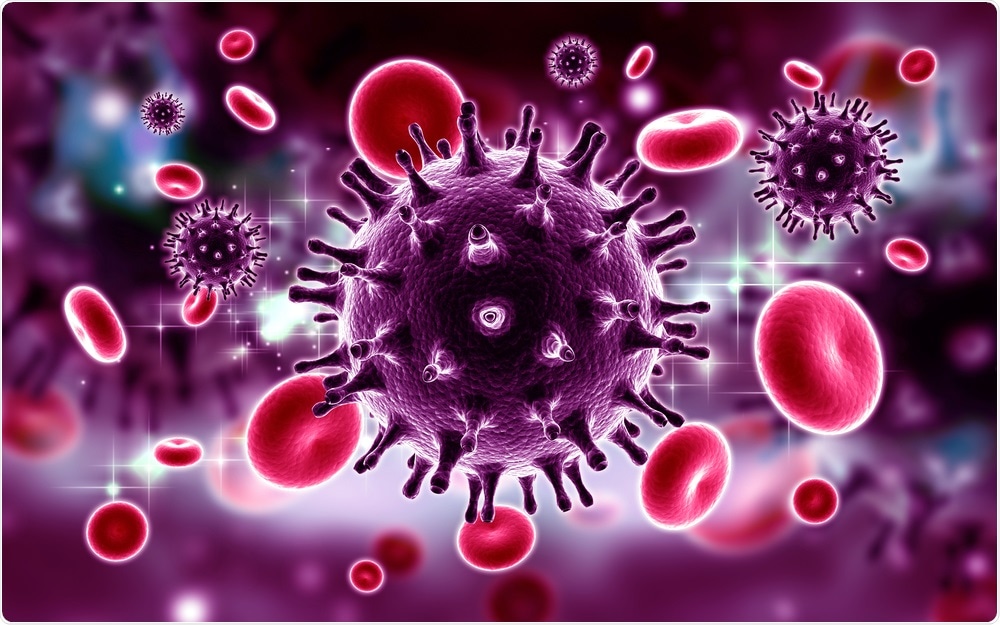Researchers at the Karolinska Institutet, Sweden, have made an important discovery about a poorly understood group of immune cells (mucosa-associated invariant T [MAIT]cells) that could improve understanding of what happens during the initial stages of HIV infection.

Image Credit: Raj Creationzs/Shutterstock.com
Previously, researchers’ understanding of exactly what occurs during the initial stage of HIV has been limited by the fact that people diagnosed with the disease have often been infected for a while before the studies begin.
Knowing more detail about how the immune system works during this initial phase could help researchers to home in on potential future interventions.
About MAIT cells
In recent years, an unconventional group of immune system cells - MAIT cells - has captured the attention of immunologists due to their abundance in humans (up to 10 percent of the T cells in the blood) and the wide range of infectious and non-infectious diseases they are involved in. Furthermore, unlike other T cells, MAIT cells react to vitamin-based metabolites that are released when bacteria grow, rather than the peptides and lipids that are generated.
What did the current study find?
"Through close collaboration with the Walter Reed Army Institutes of Research, we have gained access to an extensive biobank where we have been able to study samples from individuals, both before and after they have been infected with HIV," Sandberg, Senior Author
Although the primary role of MAIT cells is to control bacteria at barriers such as the skin and mucous membranes, combating bacterial infections such as tuberculosis, for example, these cells also respond to HIV, even though it is a viral infection.
As reported in Nature Communications, Johan Sandberg and the team have now shown that MAIT cells respond to initial HIV infection with dynamic activity and by reprogramming gene expression.
Despite scientists’ lack of awareness of MAIT function during the initial phase of HIV infection, the researchers think this response is likely due to the immune system losing control over bacterial populations when a person becomes infected. Previous research conducted at the Doherty Institute in Melbourne has shown that MAIT cells provide a level of protection that is especially important when other parts of the immune system are compromised.
MAIT cells expand to fight bacteria, but their antibacterial function starts to decline
"Previous observations have shown that MAIT cells disappear in the later stages of HIV infection. In this study we can see that the MAIT cells expand at the initial stage with strong activation to fight the bacteria," says Sandberg. “We also discovered that the gene expression patterns of the MAIT cells change gradually during the initial phase,"
Sandberg adds that the MAIT cells adopt different characteristics and start to lose their antibacterial function, which can weaken a person’s immune defense.
The study findings could help researchers fill in the details of exactly what happens during the initial stage of HIV infection.
"In the HIV research that is currently being conducted, the focus is on developing vaccines and finding cures," says Sandberg. "Knowledge of how the immune system works in the initial phase of HIV infection, such as the activity and properties of the MAIT cells, can facilitate the finding of future interventions."
Sources:
Discovery on the activity and function of MAIT cells during acute HIV infection. Eurekalert 2020. Available at: https://www.eurekalert.org/emb_releases/2020-01/ki-ndo011320.php
How do MAIT cells identify and attack foreign invaders? Medical Express 2019. Available at:
https://medicalxpress.com/news/2019-11-mait-cells-foreign-invaders.html
Journal reference:
Godfrey DI, et al. The biology and functional importance of MAIT cells. Nature Immunology 2019l 20: 1110–1128 Available at: https://www.nature.com/articles/s41590-019-0444-8